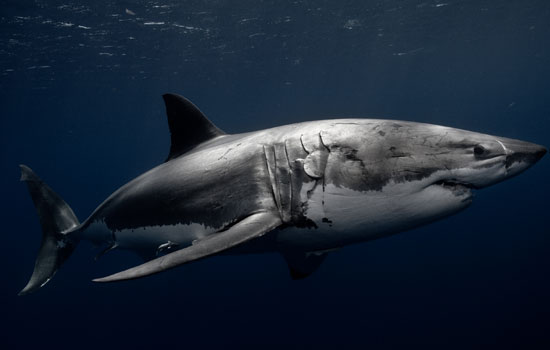Scientists have begun a new research program around Cape Cod in Massachusetts, focusing on movements and behavior of a growing great white shark population, to reduce the increasing potential for interactions with humans.
Atlantic white sharks are the center of attention in the frenetic Cape Cod summer tourism season, as the combined resurgence of their primary food source, gray seals, and the shark population plays out.
The shark season has been early and active, with numerous sightings and several temporary beach closings ordered as a result in July. It’s been just one year since two shark attacks off cape beaches resulted in the first recorded fatal shark attack in Massachusetts since 1936 when a body board rider was killed.
Instead the Massachusetts Division of Marine Fisheries, the nonprofit Atlantic White Shark Conservancy based at Chatham, Mass. and other partners are in a new push to expand their study of white shark movements and behavior, with an emphasis on improving public safety in nearshore waters and channels where the animals hunt seals.
It’s too soon to say conclusively that 2019 will be a record year for sharks, according to Greg Skomal, a fisheries biologist with the state Department of Marine Fisheries who leads shark research. But the signs are pointing that way.
“On a relative scale it seems like July of 2019 is much stronger than previous years,” said Skomal. His team tagged 15 sharks in that month, a number usually not reached until later in August.
“Water temperatures play a major role in arrival and departure” of sharks off the Cape, and warmer water can influence earlier arrivals, he said. Typically shark numbers peak late in the summer and early fall from August into October, before dropping with cooling waters in November.
“We know there’s a very distinct seasonality to the sharks,” said Skomal.
That seasonality begins at the same time people are drawn to the beach, and the 2019 peak of tourism season coincided with a flurry of eyewitness accounts of shark appearances, from a great white cruising the surface in Cape Cod Bay and attracting television news helicopters, to vacationers witnessing a shark killing a seal about 70 feet off Coast Guard Beach in North Truro.
A reporter for Bloomberg went along on a $2,500 shark-watching expedition from the Chatham Bars luxury resort, with the chance for clients to see their own shark vs. seal Circle of Life moment. A family on a fishing charter got that unexpectedly, when a shark swiped a fish they were reeling in, just feet from the transom.
It was all priceless made-for-media timing, with the Discovery Channel’s annual Shark Week television extravaganza that started July 28, and local television news stations in Boston and other East Coast markets marketing their own shark programming.

A white shark, at top, approached a crowded bathing beach at Wellfleet, Mass. Wayne Davis/ Atlantic White Shark Conservancy photo
On the beaches and water, the shark conservancy and DMF share information with Cape Cod local governments and the public, with online updates about shark sightings, and occasionally photographs to demonstrate the sharks’ close approaches.
High-tech tagging by the researchers includes attaching acoustic pingers to track individual shark movements over time, and pop-up archival tags that release from the fish after a time to transmit their data to shore via satellite.
With the new five-year program starting this summer, the team is focusing on shark movements and seeking to develop fine-scale tracking of how the animals behave, particularly in nearshore waters where they hunt seals. That work includes using satellite tags to record when sharks accelerate and dive, to help reconstruct their hunting patterns.
“We want to know how, when and why the sharks attack seals,” said Skomal.







